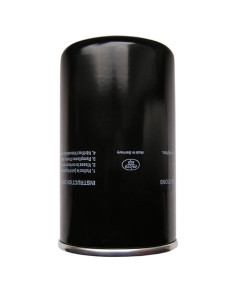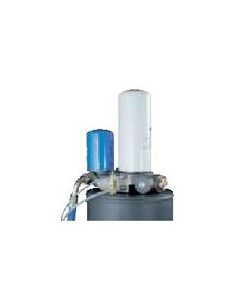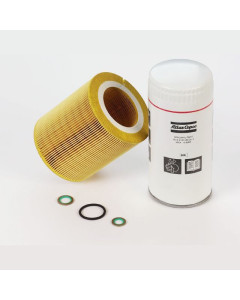Oil Filters for Screw Compressors
Oil filters for screw compressors are essential components in the maintenance and optimal operation of industrial compressed air systems. These specialized filtration devices are specifically designed to remove contaminant particles from the lubricating oil circulating through the compression system, ensuring protection of the screw element and significantly extending the compressor's service life.
At Pneumatig, we offer a wide range of high-quality oil filters compatible with leading screw compressor manufacturers, including models for Atlas Copco GA, Atlas Copco GX, and other market-leading brands.
Importance of Oil Filters in Screw Compressors
Unlike piston compressors, screw compressors operate using a system of helical screws that rotate at high speeds. This mechanism requires constant and efficient lubrication to:
- Reduce friction between rotating elements
- Dissipate heat generated during compression
- Seal compression chambers to maximize efficiency
- Prevent corrosion of internal components
The oil in these systems is subjected to extreme temperature and pressure conditions, which accelerates its degradation and the formation of contaminants. A quality oil filter is crucial for keeping the oil clean and maintaining its lubricating properties.
Key Takeaways: Importance of Filtration
- A poorly maintained oil filter can reduce compressor efficiency by up to 20%.
- Regular replacement prevents costly breakdowns in the screw element.
- Proper filtration can extend oil life by up to 30%.
Technical Characteristics of Oil Filters for Screw Compressors
Oil filters for screw compressors have specific characteristics that differentiate them from other industrial filters:
- Advanced filter media: Typically manufactured with synthetic materials or treated cellulose capable of retaining particles down to 10-25 microns.
- High-pressure resistance: Designed to withstand operating pressures of up to 15 bar (218 psi), common in industrial compression systems.
- Chemical compatibility: Formulated to resist interaction with specialized synthetic oils used in modern compressors.
- Anti-drain valves: Incorporate systems that prevent oil drainage when the compressor is turned off, ensuring immediate lubrication upon startup.
Selection Criteria for Oil Filters
Choosing the right oil filter for your screw compressor should be based on several critical factors:
- Compatibility with the specific model: It's essential to verify that the filter is compatible with your compressor's make and model to ensure a perfect fit and optimal performance.
- Filtration capacity: Depending on the operating environment, a filter with greater or lesser particle retention capacity may be necessary.
- Flow resistance: A filter with low flow resistance minimizes pressure drop in the system, improving the compressor's energy efficiency.
- Maintenance interval: Some high-end filters offer extended change intervals, reducing maintenance costs and downtime.
Maintenance and Replacement
Proper maintenance of oil filters is essential for the efficient operation of screw compressors. It is recommended to:
- Replace the oil filter according to manufacturer specifications, generally every 2,000-4,000 operating hours.
- Perform filter changes simultaneously with oil changes to optimize system performance.
- Visually inspect the used filter to detect possible system problems (excess metal particles, abnormal residues).
- Always use filters of equivalent or superior quality to the originals to ensure adequate protection of the compressor.
Negligent filter maintenance can cause serious damage to the screw element, the repair or replacement of which represents a significantly higher cost than that of a regular preventive maintenance program.
Advantages of High-Quality Oil Filters
Investing in superior quality oil filters for your screw compressor offers multiple benefits:
- Greater energy efficiency of the compressor, with consequent savings in operating costs.
- Reduction of downtime due to failures related to inadequate lubrication.
- Extension of the useful life of both the oil and the compressor itself.
- Better quality compressed air, with less oil residue in the system.
- Lower environmental impact by optimizing oil and energy consumption.




Login and Registration Form